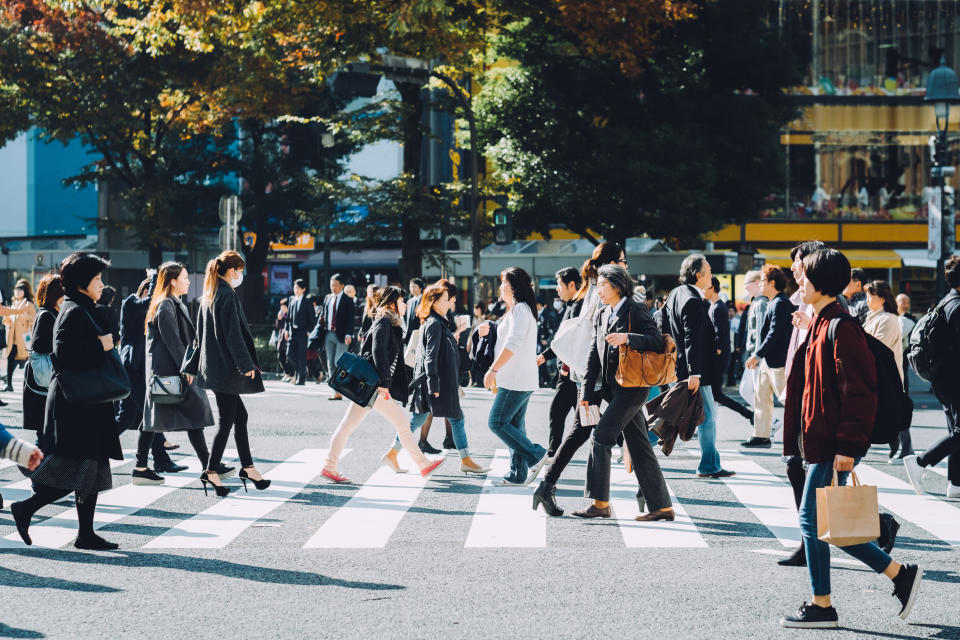I Am Fully Convinced The US Is In The Bad Place After Reading These 16 Wildly Different Experiences Americans Had Working Abroad
Recently, I asked Americans in the BuzzFeed Community to share their experiences living and working abroad, and how they compared to the US. The replies were thorough, thoughtful, and eye-opening. And TBH, I learned other countries treat their workers muuuuch different. So, let's hear what everyone had to say.
1."Neat thing about working in the UK…you don’t have to do taxes!!! The government already knows what you make. You can always send in a request for review if something has changed through the year or if you think they calculated it wrong, but it’s just a little note saying, 'Hey, can you take another look at this?' It’s AWESOME!"

While many people don't have to file their own taxes in the UK, a good number of workers still do, like those that are self-employed or those who make a total taxable income of more than £100,000.
2."I’ve lived and worked in New Zealand for seven years now. The work culture is very different. Ten sick days a year. Four weeks annual leave that you aren’t judged or frowned upon for using. Better work/life balance. Less pressure to climb your way to the top. People are willing to help you grow and teach you if you ever want to try something new. I like to say there’s not as much of a rat race here."

3."I moved to Canada five years ago. Income tax is the same, but I get healthcare which is a HUGE bonus. I get roughly the same base amount of time off, but the pay is higher. When I am sick, and I no longer have to make the groceries vs. doctor decision."

—Anonymous
4."I live in Germany, and while immigration and the bureaucracy was incredibly difficult, I have nothing but positives to say about living here. Vacation time is a priority, and depending on where you live, minimum wage can actually be enough to support you. Healthcare is good, and the insurance doesn’t argue with what the doctor says is needed. We pay social insurance every month from our paychecks, and that covers you if you cannot work or lose your job. You get paid for sick days as well."

"The government properly works for its people, and there are so many departments and offices that you can find help when you need it. The more I learn about the inner workings of German elections and the safeguards in place within their government, the more I realize how flawed the US government and election system is. While I love my country and am thankful for the opportunities being American has given me, I am flat-out scared with the direction the US government is taking."
—Anonymous
5."I teach at a secondary school in France, which means 18 hours of classes a week, which I’ve arranged into a four-day work week. Don’t get me wrong, I spend lots of time planning, preparing, and correcting papers, but I can’t imagine ever going back to that all-day bell-to-bell schedule in the US."

6."My sister has lived and taught in China, Kazakhstan, and Vietnam... Her big takeaway is how well she is treated in other countries. The parents of her students treat her with so much respect, and they truly appreciate what she does. She told me she will never teach in the US because of how teachers are treated, the lack of pay, and the district/admin not listening to their teachers. She gets paid slightly more than the average teacher in the US, but the cost of living is much less in these countries, so she is able to travel and save money."

7."My company decided to start hiring new people in our Brazil office, so they promoted me to train and supervise them there. I’m fluent in Portuguese and have visited our Brazil office many times over the years, but I deeply underestimated the difficulty of starting an adult life from scratch in a wildly bureaucratic country. I’m lucky to be surrounded by a wonderful and supportive team, but every decision/need has been so much more complex to resolve on my own…"

"...like understanding differences in how utilities are billed, discovering new condo rules as you accidentally break them, figuring out what bikini wax service to book in Portuguese (and being terrified of the Google results), and finding plus-sized clothes (and learning your size in a different system). It’s been an extremely humbling experience that has slowly taught me to embrace the fact that I struggle and need help sometimes (recovering eldest daughter here). That being said, one year in, I’ve learned so much, met wonderful people, and still get swept up in how charming and special Brazil can be. I’m glad I took this opportunity, despite how confusing and lonely it can be."
—Anonymous
8."I moved to South Korea and worked as an English teacher for five years from 2014–2019. I worked a lot of hours, and academies were pretty hit or miss. I liked mine enough, but some days, I was teaching 11 classes in a row, plus taking care of the kids during lunch. The expectation to work even when sick was a bit toxic. That being said, the healthcare was really good. When I needed the doctor before I had access to insurance, the out of pocket costs were basically nothing compared to the US."

—Anonymous
9."I’ve worked in the legal tech industry for 10 years. I moved to London in the height of the pandemic from Seattle. In the US, communication is very direct. I remember an old boss telling me to not use sorry unless it’s warranted because you don’t want to put the idea in the client's head that your tone is 'at fault.' London is very different. Using pleasantries in communication is common. Requests are very indirect."

"I remember once in a meeting I volunteered to cover a weekend task that was presented to the group. My boss messaged me on the side and asked me to stand down as it was actually directed to another person on the team to volunteer. I remember thinking, 'Why didn’t he ask X directly?' Lots of unspoken subtleties and politics to navigate."
"...And in my industry, court deadlines rule everything. While that pressure is felt on both sides of the pond, it’s definitely more chill here in the UK. It’s common for things to slow down during the summer because everyone in the industry takes holiday for three weeks. Weekend work is not common. In Seattle, I worked 45–50 hours a week for years. That’s just not the case in the UK. I put in my 40 hours, and on the rare occasion, might have to peek at work stuff on the weekends."
"The pay is way better in the US, however. Way, way better. In general, no industry is paid very great in England. With inflation over the last few years due to the pandemic and Brexit, I’ve literally watched prices for everything from groceries to bills climb up to 20% just in the last three years. But coming from Seattle, it’s not much better there either."
—Anonymous
10."I worked for two years at a university in Tokyo. I think Japanese work culture is probably more severe than that in the US in some ways. People work all the time. Thankfully, I was able to keep strict work-life balance while I was there, but I think it was mostly because I worked in a department with a large non-Japanese contingent. It was a lovely experience overall, though, and I really enjoyed my time there."

—Anonymous
11."I have been living and working in Australia for eight years now, and it still blows my mind that we get four weeks vacation leave, plus ten days of sick leave. And if we ever get sick, going to the doctor is FREE. I grew up only going to the doctor if things were really bad, like a broken bone or stitches because it was such a high expense, even with insurance. Taxes may be higher here, but having the ability to go to the doctor, dentist, and hospital for free or <$50 makes it so worth it. And don’t even get me started on the university costs that the government covers and you don’t have to pay back unless you’re earning over $50k/yr. Brilliant!"

—Anonymous
12."What happens in Thailand that would never happen in the US? The workplace is much slower. Inactivity will not get you fired, but annoying a higher-up will. If there is any chance of making a wrong decision, no decision will be made. Thai culture is high-power distance, while we are low-power distance in the US. Punctuality in Thailand is optional. Conversely, there is a directness in the US workplace that you will not see in Thailand. This is both good and bad. Good in that problems can be quickly identified and addressed. Bad in that some very cruel things can be said and done in a US workplace that would not be tolerated in a Thai context."

—Anonymous
13."I live in the Netherlands. I get 35 days off a year, and I am urged to take off at least two straight weeks during the summer. I had a baby, had surgery, and stayed overnight in the hospital and received no bill. Though, the Dutch have a combined social and private healthcare system, so I do pay €300/month for my family of three. As a negative: Dutch food is terrible. Everything is fried or very sweet, and there are hardly any organic options in the grocery stores."

"When I was complaining to a Portuguese coworker, she said, 'Dutch food has no flavor, but you’re probably used to that since you ate McDonalds every day.' 😒 Reader, I can count on one hand how many times I’ve eaten McDonalds. She assumed that’s the only thing Americans eat."
—Anonymous
14."I’ve been teaching in Sweden for five years, and I’ll never teach in America again. If something happened and I was needed back in the US, I would quit teaching (which I love). In Sweden, we are maxed out at 18 contact hours with students and have much more flexible schedules. I’ve worked in a few different schools here, and it’s not all rainbows, but those aforementioned differences are HUGE in making teaching sustainable."

—Anonymous
15."I was born in Poland, but grew up in the US (dual citizenship). After college, I thought it was the perfect time to try out life there. I still have family there and know the language. Well, life was definitely cheap, and I got a job super fast (which paid little, but it was enough to have good quality of life). It was a struggle, though, because I was viewed as American rather than Polish. An interviewer once told me she couldn't hire me because she would lose her job to me as I was too 'ambitious' in her eyes."

"The real problem, though, was when I decided to come back home to the US permanently a few years later. It took me two years (two years!!) to find a FT job in the US, even though I had years of experience working in international companies in Poland. Recruiters would see my résumé and ask, 'Do you speak English?' They basically considered my experience from Europe nonexistent."
—Anonymous
And lastly, this entry might have just convinced me to move to Germany:
16."I came to Germany many years ago via the US military as a civilian. After many years, I received my permanent residency. The difference between Germany and the US is night and day":

"1. Firstly, it seems it takes an act of God to get fired in Germany. The regulations that protect employees' rights are much more strenuous here, and I'm not even a union member. Nobody, no matter how badly they've messed up, is ever left high and dry with no income. It just doesn't happen unless you murder your officemate or something really, really extreme. And even in that case, you won't likely be turned down for unemployment.
2. Not only do I automatically get six weeks of vacation per year, I also get unlimited sick leave. Sick absences do not require proof unless they are more than three days, and I've seen doctors write two-week notes for mild colds — wild. I had spinal surgery last year and got nine weeks off work. The company paid my full salary for the first six weeks, then it went down to 75% or so. But the remaining 25% was made up by my health insurance (which is not private). The German mentality is, in my view, 'If you're sick, you're sick. Period.'
3. I've never been pregnant, but my colleagues generally take 6–12 months off after giving birth. But if they want more time off, they can have it (fathers, too, by the way). Even if they're not collecting income during that time, their job must be waiting for them when they return. One colleague of mine had triplets so she got TWO years off.
4. There is no stress when asking for time off. Quality of your overall life is so much more of a priority here. When you want to take a vacation, nobody guilts you, even if you want to take time off at the same time [as] your colleagues. I've seen entire, granted smaller, companies shut down for the month of August to accommodate vacations. It's totally wild. It would never, ever happen in the US. You do not get work calls, emails, or messages while you are on vacation because your time off is RESPECTED by everyone, even your friends!
It is for this reason, and the healthcare situation over here, that I will never return to the United States to live and work. It's just toooooo good here. I will never go back to being under-appreciated and overworked with very few benefits. This change has also made me a better employee. They give me so much leeway and understanding and chances, so I give them my all and carefully choose my battles when necessary, of which there are few, because I am not disgruntled."
—Anonymous
Have you ever worked abroad? What was your experience like, and how did it compare to your home country? Did you enjoy the workplace customs or find them challenging to navigate? Let us know in the comments below!
Note: Submissions have been edited for length and/or clarity.

